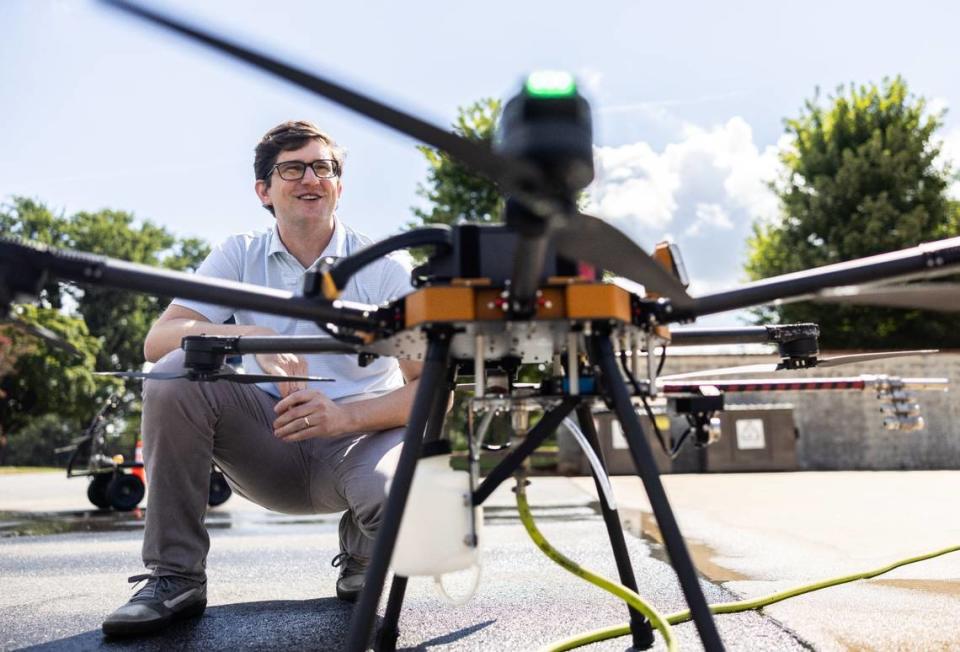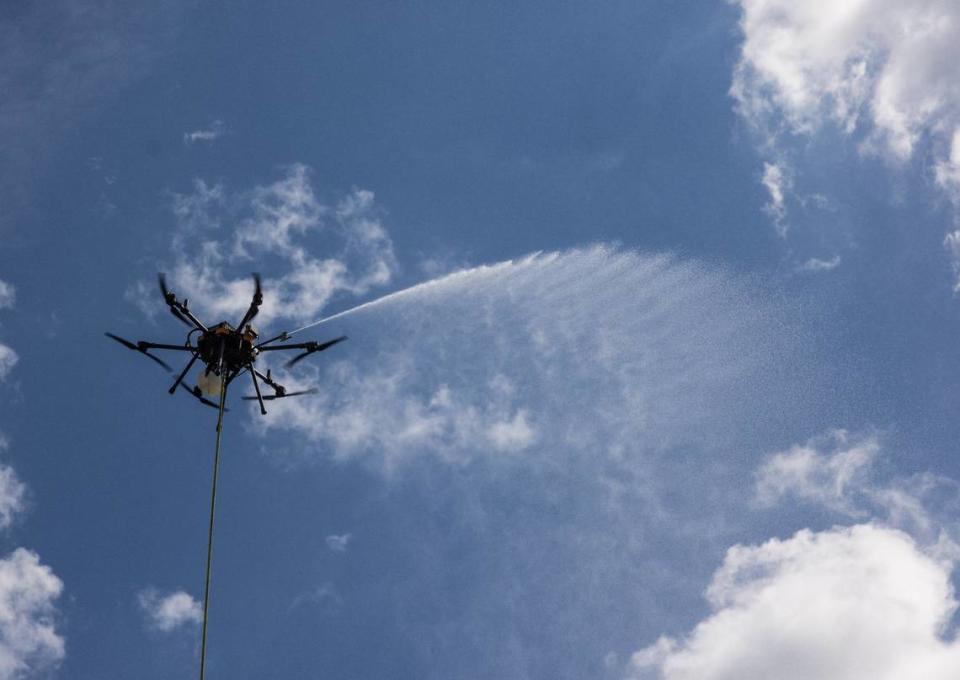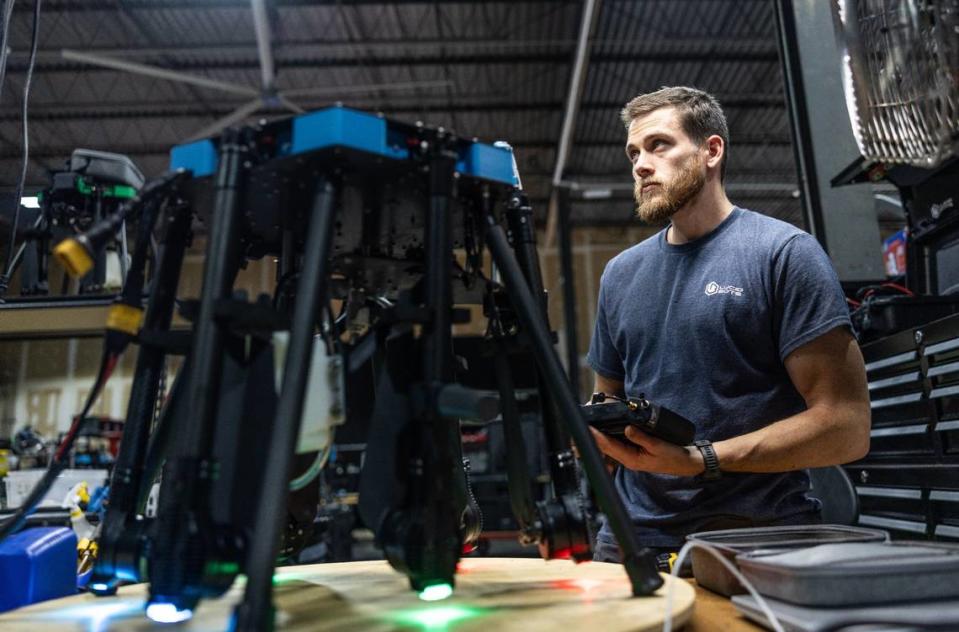How a Davidson College grad created his own robots business, then leaned into AI
During a Davidson College class in his junior year, Andrew Ashur stared out the window and saw something that would ultimately lead him to create his own company that focused on robots tackling dangerous jobs.
Ashur had spotted window washers working on a large building from a swing stage on a windy day.
“The platforms started slamming into the building and the workers were hanging on for dear life,” he said. “There aren’t enough people that are willing to do these dangerous jobs. (I) wanted to take this dangerous job and make it safer.”
The Virginia native spent months reading forums and watching hours of YouTube videos on how to build things.
After graduating in 2018 with degrees in economics and Spanish, Ashur began building robots full-time in the garage of his rental home in Charlotte, founding a company he called Lucid Bots Inc. The Charlotte robotics manufacturing business makes commercial-grade cleaning robots.
On Wednesday, Lucid Bots went a step further by acquiring Chicago-based artificial intelligence software company Avianna for an undisclosed price. The software enables natural language communication between a robot and its operator.

It’s “the brains” of the robotics, Avianna founder Vic Pellicano said.
Like ChatGPT, a popular large language AI model trained to answer questions with context, Lucid’s robots will be able to understand and act on commands rather than being controlled manually by a joystick, or requiring coding and programming.
“It makes the technology more accessible. I could have a conversation with our robots and ask it to do different tasks,” Ashur, 28, said.
Inside Lucid Bots’ robotics
Lucid Bots has two primary pressure washing products: Sherpa cleaning drone for building surfaces, windows and roofs; and the Lavo Bot ground surface cleaning robots.
The drones have been used in the Charlotte region, for example, at UNC Charlotte and Davidson College campuses, while the ground bots have been used in places like Bank of America Stadium.
The robots lets “customers do more jobs in less time, with less liability,” Ashur said.
On Tuesday, Lucid Bots’ manufacturing site at Northpark Business Park in north Charlotte was busy with 3D printers humming, workers soldering wires and drones undergoing tests. The engineering, manufacturing and support for Lucid Bots’ machines are all done in Charlotte.

Robotics technician Dolan O’Neill was working on the 3D printers, which make the hard plastic hardware frames. He watched a live video of a customer’s Sherpa drone cleaning the windows and side of a building at Appalachian State University in Boone.
The pressure-washing drones use radar for touch-free cleaning.
“It can work at night, and in all kinds of conditions,” Robert Blank, Lucid Bots head of product, said during a tour of the facility.
Outside, quality control lead Daniel Jankoski ran a maintenance check on a customer’s Sherpa drone. The drone with six arms weighing over 30 pounds was attached to a hose. It buzzed along the side of the building spraying at 4,400 psi. Jankoski checked the Sherpa’s spin, pitch and roll, and sent it high into the sky.
The drones can go as high as 140 feet, Blank said. That’s about 10 stories high.
Blank also showed how the Lava Bot maneuvers with rollers on its wheels. It can handle different terrains and move sideways or make 360-degree spins while cleaning cleaning sidewalks, for example.
The drone price starts at about $35,000 and ground bots cost about $10,000. Lucid Bot also works with rental companies like Sunbelt.

Lucid Bots is growing fast
Lucid Bots has grown to over 40 employees in six years. And the company is hiring for sales, marketing and engineering positions. The drones and bots are sold throughout the U.S., and in Canada, Mexico and New Zealand.
Lucid Bots’ revenue last year was just over $3.5 million, Tech Crunch industry publication reported.
In November, the company’s manufacturing and office space tripled, moving into a 21,000-square-feet space. “I don’t know how long we’ll be able to stay in the space,” Blank said.
In May, Lucid Bots raised $9.1 million in seed funding to help its expansion, including acquiring Avianna. It also has startup investments from Cubit Capital, Idea Fund Partners and Danu Ventures.
Lucid Bot is already eyeing additional growth to fill other needs in dangerous jobs from agriculture to bridge maintenance.
“Robots are the future of manual work,” Ashur said. “Charlotte’s known as a banking town right now. But ... pretty soon this is going to be known as a robotics town.”

 Yahoo Finance
Yahoo Finance 